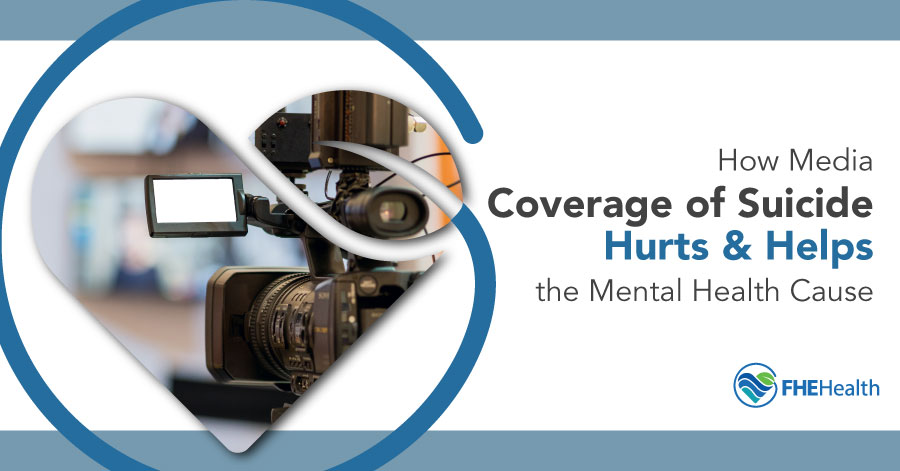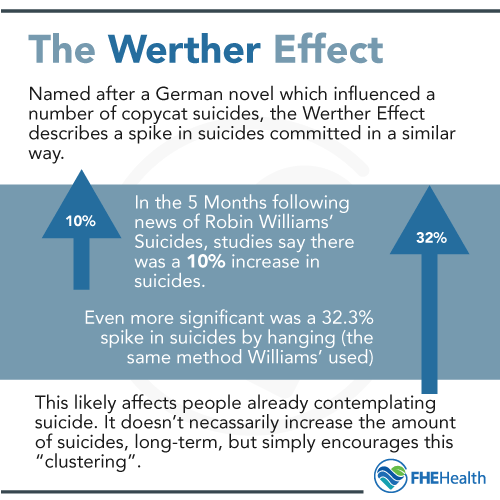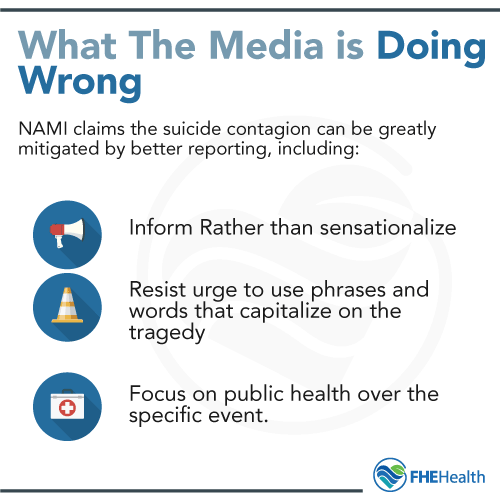
On August 12, 2014, legendary actor and comedian Robin Williams committed suicide. The next morning, the New York Daily News published the news with a single-word headline, “Hanged,” in reference to the way Williams chose to take his own life.
Over the next five months, the number of suicides rose by nearly 2,000 over the expected average during that period. It’s thought that the New York Daily News’ inflammatory headline is one of the explanatory factors for this dramatic rise in what are commonly called copycat suicides.
Interestingly, this phenomenon didn’t coincide with the rise of new media. The same effect was observed when actress Marilyn Monroe committed suicide in the 1960s.
The first rash of copycat suicides can be traced back to a tragedy written in the 1770s called “The Sorrows of Young Werther,” a tale of doomed love told in a series of letters from one man — who eventually committed suicide — to another. Historical records tell of a sharp increase in suicides after the novel was published.
In the case of Robin Williams, it’s thought that the sensational reporting is a large part of the reason suicides rose after the tragic event. Rather than looking at the psychological issues Williams was dealing with, the media instead chose to focus on the way he took his life, in turn glorifying his suicide and missing the opportunity to publicize the need for better mental health care.
This, courtesy of FHE Health, is a discussion of how suicide is covered in media and how changes can help limit copycat suicides and bring more light on the struggles that cause people to take their own lives.
How Media Covers Suicide
 There is a fundamental clash between the news and somber events like suicides, mass shootings and other tragedies that occur across the country. News organizations are competing for readers to sell subscriptions, papers and clicks.
There is a fundamental clash between the news and somber events like suicides, mass shootings and other tragedies that occur across the country. News organizations are competing for readers to sell subscriptions, papers and clicks.
This means that the news looks for opportunities to sensationalize because a juicy gossip piece is always more interesting to the public than objective news content.
There’s real evidence that this type of reporting can be dangerous. Mental health research suggests that when a person is considering suicide, seeing news stories that focus on the details of the suicide rather than the mental health aspects of the person involved can inspire them to take similar action.
The Suicide Contagion
The technical term for the influence that spurs copycat suicides is called suicide contagion. This describes the research-backed theory that one notable suicide will be followed by a significant increase in other suicides, especially depending on the way the first is reported.
According to ReportingonSuicide.org, more than 50 studies suggest that certain types of reporting cause more suicides in the wake of a major tragedy.
A way to highlight this effect is to compare notable suicides: Robin Williams and Kurt Cobain. The former’s suicide was described in the press in vivid detail, and as mentioned, the rate of suicide rose by 32% in the months following. The details of Cobain’s death were hidden from the public by the deceased’s family, and because of this, the suicide rate didn’t move much.
What Today’s News Is Doing Wrong and How to Fix It
 According to the National Alliance on Mental Illness, suicide contagion is caused by irresponsible reporting.
According to the National Alliance on Mental Illness, suicide contagion is caused by irresponsible reporting.
When news outlets focus on the suicide and go into morbid detail about the method rather than focusing on the victim’s struggles with their own mental health and their lasting impact on the world, it prompts people who may be struggling with their own mental health to see suicide as a valid solution. Here are a few tips to avoid the copycat effect, according to NAMI:
Inform rather than sensationalizing the event. Headlines should never include implications of the way someone committed suicide or even that a suicide has occurred at all.
Choose words carefully outside of the headline. Resist the urge to use words and phrases that draw readers in, such as suicide epidemic, suicide spike and skyrocketing suicide rates.
Focus on the public health factor over the event. Was this person open about their mental health, or did they struggle with it publicly? Reporting about suicide should always include resources for people considering suicide and advice for the family members and other loved ones of those who may be having suicidal thoughts. For example, local papers could guide readers to regional support groups and hotlines or link them to resources on mental health, depression and the complex issues that surround these topics in a family setting.
It’s Not Just in the News
Of course, other media is known to fuel irresponsible narratives about suicide, none more prominently over the past few years than the controversial Netflix Series, “13 Reasons Why.”
The show does bring to light a focus on mental health in teenagers, which can be seen as a positive force. However, critics of the show in which a student commits suicide and leaves 13 tapes explaining her reasoning say that it glorifies suicide by painting it in such a poetic way.
This, and other movies, books and TV shows that cover themes of suicide have varying impact on how we treat the issue in society, but the worry is that emphasis is more on the act of suicide and less on how to prevent it and increase awareness of common mental health issues like depression and anxiety.
What We Can Do Better
More than the tragedy of suicide itself, what we do when we report on it so irresponsibly is detract from the impact of the people who take their own lives. Anthony Bourdain, Kate Spade, Robin Williams and the countless other people who have fallen victim to suicide left behind a legacy that cannot be understated.
Of course, when a famous person commits suicide, it doesn’t mean that their lives were worth more than anyone else, but these cases are the best (and largely, a missed) opportunity to publicize a growing public health issue.
For more information on mental health treatment and suicide prevention, contact FHE Health.






